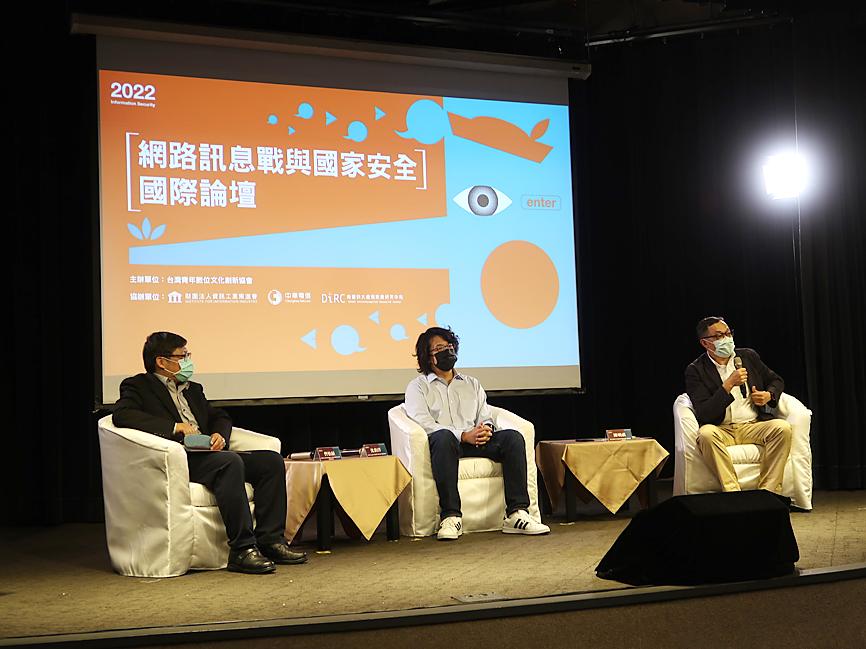China’s cognitive warfare tactics against Taiwan include spreading anti-US and anti-Japan messages to wear down Taiwanese’s psychological defenses, an information warfare expert said yesterday.
Shen Pao-yang (沈伯洋), an assistant professor at National Taipei University’s Graduate School of Criminology, made the remark at a forum on online information warfare and national security at the university’s GIS Convention Center.
Most young Taiwanese do not take a pro-China stance, so rather than sending pro-China messages, Beijing has turned its focus on directing Taiwanese’s mistrust at the US, he said.

Photo: Chen Yu-fu, Taipei Times
Unlike Ukraine, which has quickly identified “fifth column” units embedded in the country, Taiwan might not be able to do so if a war were to break out with China, he said.
Fifth column infiltrators and local collaborators could cause great harm during a war by spreading disinformation, he added.
Taiwanese’s psychological defenses are the most important factor to consider while making assumptions about a war, Shen said, adding that many Taiwanese have said they might surrender in the event of a war with China, which would leave other countries powerless even if they wanted to help Taiwan.
Shen said he used to advocate for exposing such cognitive warfare tactics, but they can only be exposed through judicial investigations, which require legal grounds.
A new mechanism is needed, as the Criminal Investigation Bureau can only pursue tax evasion charges or launch investigations based on the Money Laundering Control Act (洗錢防制法), which might only have an indirect connection with a case, he said.
Shen said he often hears young people saying they would like to receive information from various sources, including China, Japan and the US, before making a judgement while maintaining a neutral stance.
He said the “neutral stance” points to a lack of awareness of the enemy, adding that exposing China’s tactics would be ineffective if such awareness and psychological defenses are not developed first.
He and his friends have been criticized for promoting an “all-out defense,” yet China is most afraid of Taiwanese building defensive awareness, he said.
Academia Sinica academician and former National Security Council adviser Lee Der-tsai (李德財) told the event that Chinese sources have spread a false report that Taiwanese were celebrating the assassination of former Japanese prime minister Shinzo Abe, to sow animosity between Taiwan and Japan, and create social discord in Taiwan.
Taiwan must be prepared for such operations and “boost its immunity against misinformation,” he added.

ENDEAVOR MANTA: The ship is programmed to automatically return to its designated home port and would self-destruct if seized by another party The Endeavor Manta, Taiwan’s first military-specification uncrewed surface vehicle (USV) tailor-made to operate in the Taiwan Strait in a bid to bolster the nation’s asymmetric combat capabilities made its first appearance at Kaohsiung’s Singda Harbor yesterday. Taking inspiration from Ukraine’s navy, which is using USVs to force Russia’s Black Sea fleet to take shelter within its own ports, CSBC Taiwan (台灣國際造船) established a research and development unit on USVs last year, CSBC chairman Huang Cheng-hung (黃正弘) said. With the exception of the satellite guidance system and the outboard motors — which were purchased from foreign companies that were not affiliated with Chinese-funded

PERMIT REVOKED: The influencer at a news conference said the National Immigration Agency was infringing on human rights and persecuting Chinese spouses Chinese influencer “Yaya in Taiwan” (亞亞在台灣) yesterday evening voluntarily left Taiwan, despite saying yesterday morning that she had “no intention” of leaving after her residence permit was revoked over her comments on Taiwan being “unified” with China by military force. The Ministry of the Interior yesterday had said that it could forcibly deport the influencer at midnight, but was considering taking a more flexible approach and beginning procedures this morning. The influencer, whose given name is Liu Zhenya (劉振亞), departed on a 8:45pm flight from Taipei International Airport (Songshan airport) to Fuzhou, China. Liu held a news conference at the airport at 7pm,

GRIDLOCK: The National Fire Agency’s Special Search and Rescue team is on standby to travel to the countries to help out with the rescue effort A powerful earthquake rocked Myanmar and neighboring Thailand yesterday, killing at least three people in Bangkok and burying dozens when a high-rise building under construction collapsed. Footage shared on social media from Myanmar’s second-largest city showed widespread destruction, raising fears that many were trapped under the rubble or killed. The magnitude 7.7 earthquake, with an epicenter near Mandalay in Myanmar, struck at midday and was followed by a strong magnitude 6.4 aftershock. The extent of death, injury and destruction — especially in Myanmar, which is embroiled in a civil war and where information is tightly controlled at the best of times —

Taiwan was ranked the fourth-safest country in the world with a score of 82.9, trailing only Andorra, the United Arab Emirates and Qatar in Numbeo’s Safety Index by Country report. Taiwan’s score improved by 0.1 points compared with last year’s mid-year report, which had Taiwan fourth with a score of 82.8. However, both scores were lower than in last year’s first review, when Taiwan scored 83.3, and are a long way from when Taiwan was named the second-safest country in the world in 2021, scoring 84.8. Taiwan ranked higher than Singapore in ninth with a score of 77.4 and Japan in 10th with